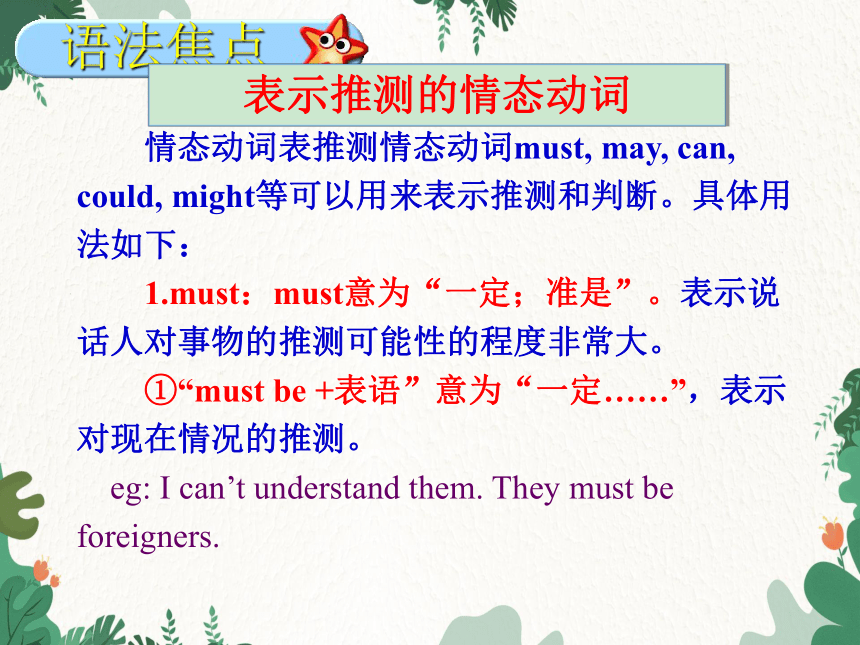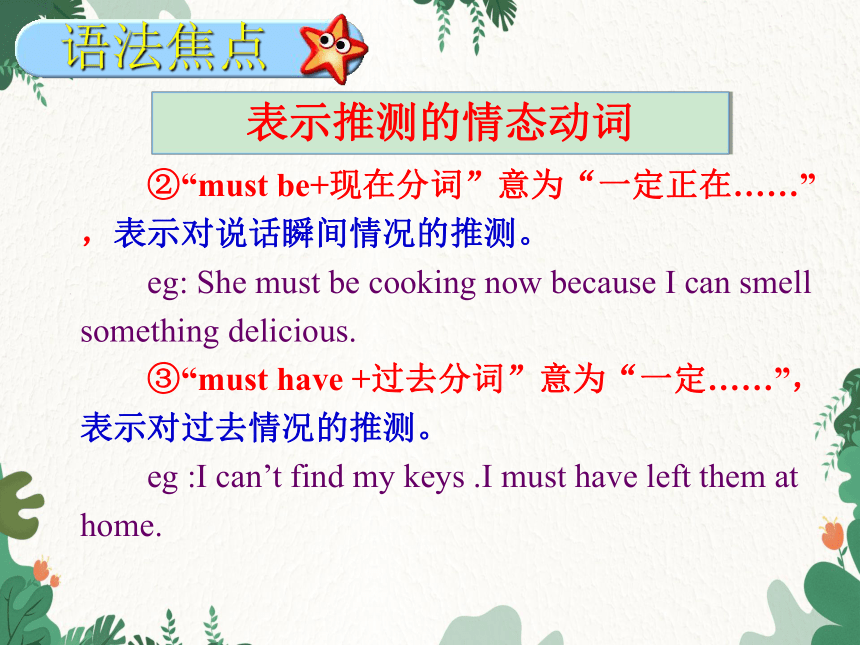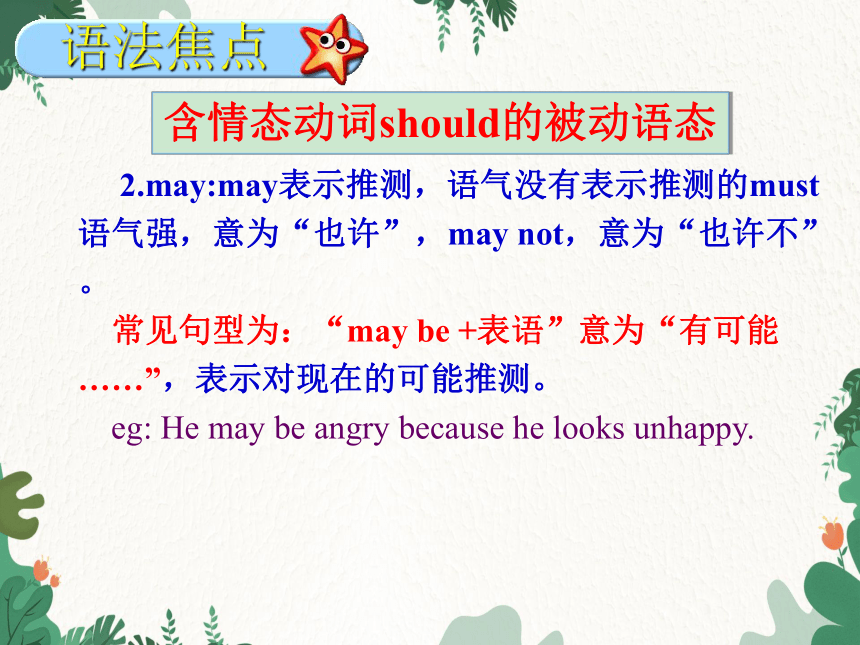人教版九年级全册Unit 8 It must belong to Carla-语法焦点与同步作文指导课件(共12张PPT)
文档属性
| 名称 | 人教版九年级全册Unit 8 It must belong to Carla-语法焦点与同步作文指导课件(共12张PPT) |

|
|
| 格式 | ppt | ||
| 文件大小 | 2.4MB | ||
| 资源类型 | 教案 | ||
| 版本资源 | 人教新目标(Go for it)版 | ||
| 科目 | 英语 | ||
| 更新时间 | 2022-10-05 00:00:00 | ||
图片预览





文档简介
(共12张PPT)
语法焦点
与同步作文指导
情态动词表推测情态动词must, may, can, could, might等可以用来表示推测和判断。具体用法如下:
1.must:must意为“一定;准是”。表示说话人对事物的推测可能性的程度非常大。
①“must be +表语”意为“一定……”,表示对现在情况的推测。
eg: I can’t understand them. They must be foreigners.
语法焦点
表示推测的情态动词
②“must be+现在分词”意为“一定正在……”,表示对说话瞬间情况的推测。
eg: She must be cooking now because I can smell something delicious.
③“must have +过去分词”意为“一定……”,表示对过去情况的推测。
eg :I can’t find my keys .I must have left them at home.
语法焦点
表示推测的情态动词
2.may:may表示推测,语气没有表示推测的must语气强,意为“也许”,may not,意为“也许不”。
常见句型为:“may be +表语”意为“有可能……”,表示对现在的可能推测。
eg: He may be angry because he looks unhappy.
语法焦点
含情态动词should的被动语态
3.can:can表示推测时,常用于否定句、疑问句中,can’t意为“不可能;应该不是”。
常用句型为:“can/can’t be +表语”意为“(不)可能……”,表示对现在情况的推测。
eg: That can’t be Maria, because she’s in hospital.
There’s someone outside. Who can it be
语法焦点
表示推测的情态动词
4. could/might: 如果表示推测的把握性不是很大时,用could或might。它们常用于肯定句或疑问句中,意为“也许;可能”。
eg: He might be doing his homework now.
Could the news be true
语法焦点
表示推测的情态动词
1.(南充中考)—Excuse me, whose book is this
—It__be John’s. It has his name on it.
A. must B. need C. can’t
2.(益阳中考)The man____be my English teacher. He has gone to Canada.
A. might B. must C. can’t
3.(新疆中考)After a long walk, the old man___be tired now.
A. can’t B. must C. has to D. need
一、单项选择。
A
强化训练
C
B
4.(乌鲁木齐中考)—I think the girl under the tree must be Alice.
—No,it__be her. She’s in the gym now.
A.can’t B.mustn’t C.may D.must
5.Martin__get here in time, but I am not sure.
A.must B.might
C.can D.should
一、单项选择。
A
强化训练
B
写作指导
本单元写作是讲述一件发生在周围的奇怪的事,同时运用表推测的情态动词对事情进行解密。把握好情态动词以及事件的逻辑顺序是写好作文的关键。
常用句型归纳如下:
1.…something strange happened in…;
2. …must be…;
3.…can’t be…;
4.…might be…
写作示例
假设今天是星期天,你正在家里午睡,突然听到敲门声,请你根据表格中的信息,写一篇短文来判断是谁,并给出判断理由。
要求:1.短文流畅、连贯;2. 60~80词。开头已给出,不计入总词数。
Inference (推断) Reason
parents (impossible) being at home
thief (impossible) being afraid
neighbor (possible) wanting some help
aunt (certainly) coming to visit us
There is a loud knock at the door…
经典示范
There is a loud knock at the door. The knock wakes me up. Who is it It can’t be my father or mother, because they are both staying at home. It can’t be a thief. The thief is afraid, and it’s impossible for him to knock at the door. It may be my neighbor. Maybe he wants some help. Oh, it must be my aunt. She often comes to visit us on Sunday.
语法焦点
与同步作文指导
情态动词表推测情态动词must, may, can, could, might等可以用来表示推测和判断。具体用法如下:
1.must:must意为“一定;准是”。表示说话人对事物的推测可能性的程度非常大。
①“must be +表语”意为“一定……”,表示对现在情况的推测。
eg: I can’t understand them. They must be foreigners.
语法焦点
表示推测的情态动词
②“must be+现在分词”意为“一定正在……”,表示对说话瞬间情况的推测。
eg: She must be cooking now because I can smell something delicious.
③“must have +过去分词”意为“一定……”,表示对过去情况的推测。
eg :I can’t find my keys .I must have left them at home.
语法焦点
表示推测的情态动词
2.may:may表示推测,语气没有表示推测的must语气强,意为“也许”,may not,意为“也许不”。
常见句型为:“may be +表语”意为“有可能……”,表示对现在的可能推测。
eg: He may be angry because he looks unhappy.
语法焦点
含情态动词should的被动语态
3.can:can表示推测时,常用于否定句、疑问句中,can’t意为“不可能;应该不是”。
常用句型为:“can/can’t be +表语”意为“(不)可能……”,表示对现在情况的推测。
eg: That can’t be Maria, because she’s in hospital.
There’s someone outside. Who can it be
语法焦点
表示推测的情态动词
4. could/might: 如果表示推测的把握性不是很大时,用could或might。它们常用于肯定句或疑问句中,意为“也许;可能”。
eg: He might be doing his homework now.
Could the news be true
语法焦点
表示推测的情态动词
1.(南充中考)—Excuse me, whose book is this
—It__be John’s. It has his name on it.
A. must B. need C. can’t
2.(益阳中考)The man____be my English teacher. He has gone to Canada.
A. might B. must C. can’t
3.(新疆中考)After a long walk, the old man___be tired now.
A. can’t B. must C. has to D. need
一、单项选择。
A
强化训练
C
B
4.(乌鲁木齐中考)—I think the girl under the tree must be Alice.
—No,it__be her. She’s in the gym now.
A.can’t B.mustn’t C.may D.must
5.Martin__get here in time, but I am not sure.
A.must B.might
C.can D.should
一、单项选择。
A
强化训练
B
写作指导
本单元写作是讲述一件发生在周围的奇怪的事,同时运用表推测的情态动词对事情进行解密。把握好情态动词以及事件的逻辑顺序是写好作文的关键。
常用句型归纳如下:
1.…something strange happened in…;
2. …must be…;
3.…can’t be…;
4.…might be…
写作示例
假设今天是星期天,你正在家里午睡,突然听到敲门声,请你根据表格中的信息,写一篇短文来判断是谁,并给出判断理由。
要求:1.短文流畅、连贯;2. 60~80词。开头已给出,不计入总词数。
Inference (推断) Reason
parents (impossible) being at home
thief (impossible) being afraid
neighbor (possible) wanting some help
aunt (certainly) coming to visit us
There is a loud knock at the door…
经典示范
There is a loud knock at the door. The knock wakes me up. Who is it It can’t be my father or mother, because they are both staying at home. It can’t be a thief. The thief is afraid, and it’s impossible for him to knock at the door. It may be my neighbor. Maybe he wants some help. Oh, it must be my aunt. She often comes to visit us on Sunday.
同课章节目录
- Unit 1 How can we become good learners.
- Section A
- Section B
- Unit 2 I think that mooncakes are delicious!
- Section A
- Section B
- Unit 3 Could you please tell me where the restroom
- Section A
- Section B
- Unit 4 I used to be afraid of the dark.
- Section A
- Section B
- Unit 5 What are the shirts made of?
- Section A
- Section B
- Review of Units 1-5
- Unit 6 When was it invented?
- Section A
- Section B
- Unit 7 Teenagers should be allowed to choose their
- Section A
- Section B
- Unit 8 It must belong to Carla.
- Section A
- Section B
- Unit 9 I like music that I can dance to.
- Section A
- Section B
- Unit 10 You're supposed to shake hands.
- Section A
- Section B
- Review of Units 6-10
- Unit 11 Sad movies make me cry.
- Section A
- Section B
- Unit 12 Life is full of the unexpected
- Section A
- Section B
- Unit 13 We're trying to save the earth!
- Section A
- Section B
- Unit 14 I remember meeting all of you in Grade 7.
- Section A
- Section B
- Review of Units 11-14
